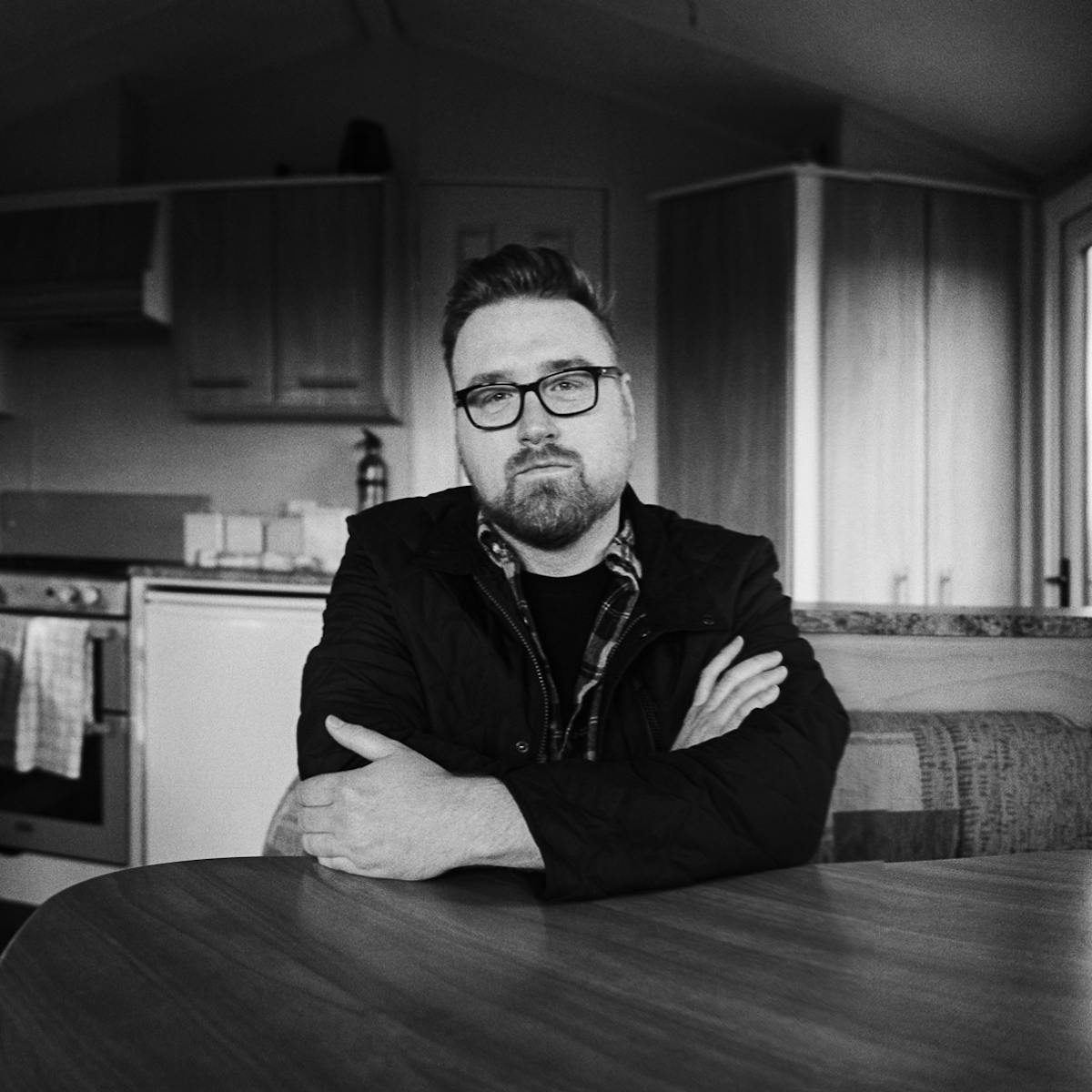Jeremy Jeffs is a filmmaker and photographer whose experience of living with ME/CFS inspired him to talk to and photograph others with the same illness. Here nine people reveal the devastating difficulties the condition brings – including their struggles to be believed by medics, to get a diagnosis, to access support, and simply to keep going.
Myalgic encephalomyelitis, known as ME, as well as chronic fatigue syndrome (CFS), is a doubly invisible illness. Not only are the symptoms hard to see, but the disease also attracts little understanding from the public and, at times, the medical profession. This leads to people with ME experiencing prejudice and disbelief, making them feel stigmatised and isolated.
I live with ME myself and for the past two years I’ve been meeting with, talking to and taking portraits of people who also contend with ME every day. Some have ME so severely that they are confined to bed, some are able to work part time, and many others struggle to simply keep up with a basic existence.
The lived experience we share has enabled me to connect and build a relationship with each person. Their words and portraits bring an identity and a visibility to an unseen community, demonstrating the range of people living with ME and the often devastating impact it has on their lives.
Dawn

Dawn, Suffolk. Diagnosed 2004.
In 1999 I caught a flu bug that I just never seemed to recover from. At first I thought it was just one of those things, but the weeks turned into months and I realised something was seriously wrong. I was tired all the time, but not just tired – completely, utterly exhausted. I was also dealing with terrible insomnia, pain and a brain fog that made it hard to think straight.
Despite how awful I felt, the doctors I saw didn’t seem to take it seriously. They thought I was depressed and put me on antidepressants, but I knew that wasn’t what was wrong. I kept thinking, “I’m not depressed, I’m sick.”
It wasn’t until 2004, after years of pushing through and trying to keep going, that I finally got a diagnosis. I was referred to a consultant who diagnosed me with chronic fatigue syndrome. There was a bit of relief in finally having a name for what was happening to me but, at the same time, it didn’t change how difficult things had become.
By then I was struggling to keep up with work. I had been with a civil servant for 17 years and really enjoyed my job. It was a big part of who I was. But as my health got worse, I had to reduce my hours and eventually I had to stop working altogether. That was one of the hardest things I’ve ever had to do; it felt like I was missing a huge part of myself.
The isolation was terrible, too. Not only had I lost my job: I was losing the social connections and the sense of purpose that came with it. And to make matters worse, my manager didn’t believe how sick I was. I remember thinking, “If only they could feel what I feel for just one day, they’d understand.” It’s hard enough to deal with the illness, but when people don’t believe you, it makes it so much harder.
But one of the worst experiences was dealing with my health insurance company. They refused to accept my diagnosis and put me through hell for years. Here I was, struggling every day just to get by, and they were acting like I was making it all up.
I think there’s a huge problem with how ME is understood and treated. A lot of doctors just don’t know what to do with it. There’s this sense of hopelessness, like they think there’s nothing they can do to help. But that’s not true – there’s actually a lot that can be done to manage the symptoms, like medication for pain or sleep disturbance.
Self-management, such as pacing, has also been helpful, but I’ve had to pay for longer-term support, as it isn’t available on the NHS. I have seen a couple of doctors who really understand ME, but they have been the exception.
Sadly, the longer it takes to get a diagnosis, the worse the condition can get, and before you know it, you’ve lost your job and your quality of life has taken a nosedive. The stigma surrounding ME is a massive barrier to getting the help we need. It follows you everywhere, like the insurance company’s surveillance. It’s so frustrating, because the last thing we need is more stress.
I’ve had to find ways to cope. I try to focus on something – anything – to keep the illness from completely taking over my life. I’ve gotten involved in things like animal welfare and service development in the NHS, which helps give me some sense of purpose. But the truth is, it’s a constant battle.
The losses I’ve faced because of ME are immense, and they’re not something you ever really get over. All I can do is keep pushing forward and hope that one day people with ME will get the understanding and support we deserve.
Pippa
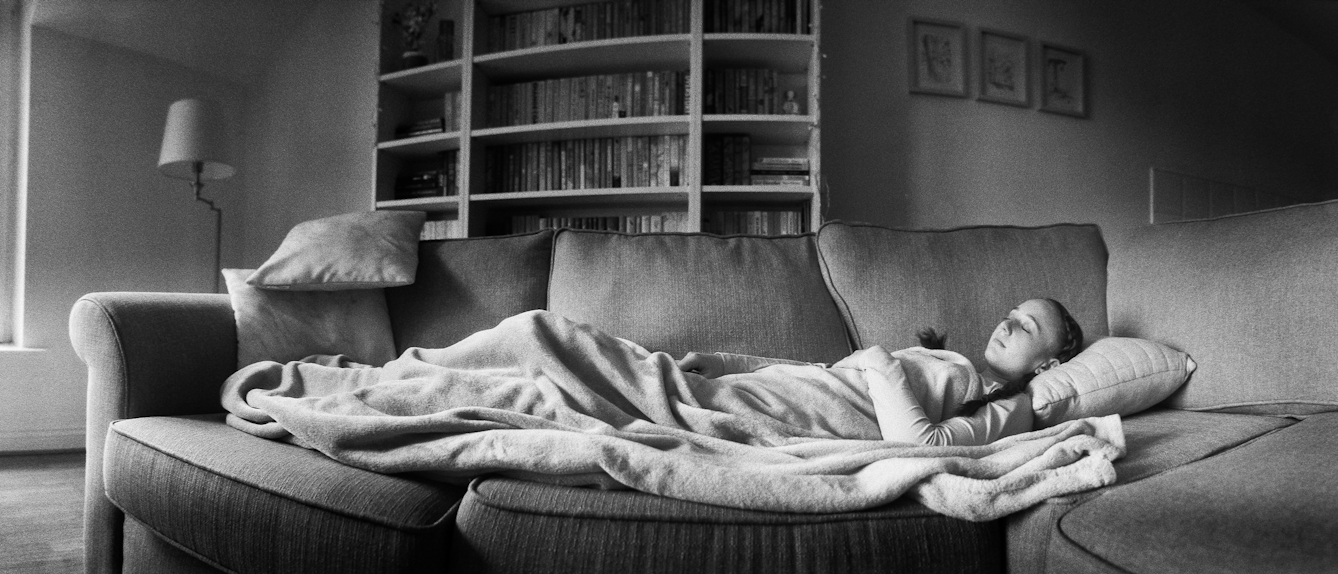
Pippa, York. Diagnosed 2014.
As a child, I was always on the go. I wanted to be the best at everything, and I was even training vocationally in classical ballet alongside attending my academic school. But when I reached my mid-teens, it was as though my body stopped listening. I began to struggle with everyday tasks I once did routinely. I tried to grit my teeth and carry on, but the more I attempted to push through, the less I could do the next time.
I visited my GP’s surgery many times, trying to explain how weak and exhausted I constantly felt, how my organs seemed like they were burning up, how loud noises or bright lights made me feel like my head was being split open, how every limb felt like it was being pulled downwards by heavy weights and that nothing I did seemed to make it better, but their response was often the same. My blood tests were coming back clear, so there was nothing to worry about – it was probably teenage hormones, or perhaps stress over my upcoming GCSEs.
At the age of 19 I experienced a major relapse. It was only then that I was finally referred to a specialist and diagnosed with ME/CFS. It was a relief to finally have a name for what I was experiencing, but I knew that this was just the beginning of a difficult journey with an illness that most people can never fully understand.
One of the toughest things to manage is post-exertional malaise (PEM). It’s like my body is playing a cruel joke on me – if I exert myself too much at any given moment, even unknowingly, I pay the price hours or days later. It’s not just feeling tired; it’s like somebody has pricked poison into the soles of my feet and it’s gradually working its way upwards through the whole of my body.
Living with ME/CFS has completely altered my life, but I do consider myself one of the luckier ones. I’m able to communicate, and to write. With adjustments I can live independently, and through using mobility aids I can leave the house and find ways to adapt some of the things I enjoy. Others with severe ME don’t have that same privilege.
I’ve had to redefine what success means for me. I love my work as a freelance writer, speaker and communication consultant, and still feel almost as ambitious as I was before. However, everything has to be meticulously planned and paced to ensure I give myself recovery time. I want to make the world a better place for other people with chronic illnesses, but I have to remember that this can’t be at my own expense.
What frustrates me the most is how misunderstood ME/CFS is, especially in the medical community. We’re often treated like we don’t know our own bodies. There’s still this pervasive idea that we just need to try a bit harder, be more determined, think positive thoughts or drink whatever green juice is trendy at the moment, and then we’d be okay. But for so many of us, this just isn’t the case – and it isn’t through a lack of trying.
I want to strike a balance between keeping hold of hope for the future and making the most of what I have now. Although I haven’t experienced recovery, there has been a significant improvement in many of my symptoms and I’m deeply grateful for this – others aren’t so lucky. But more support is desperately needed.
I never want to be seen as a victim or a sob story, but things cannot continue this way. People have been crying out for more research investment and improved patient care for decades, and this is long overdue. But in the meantime, even simply more recognition of the invisible struggles we’re going through would mean so much to so many people.
Daniel
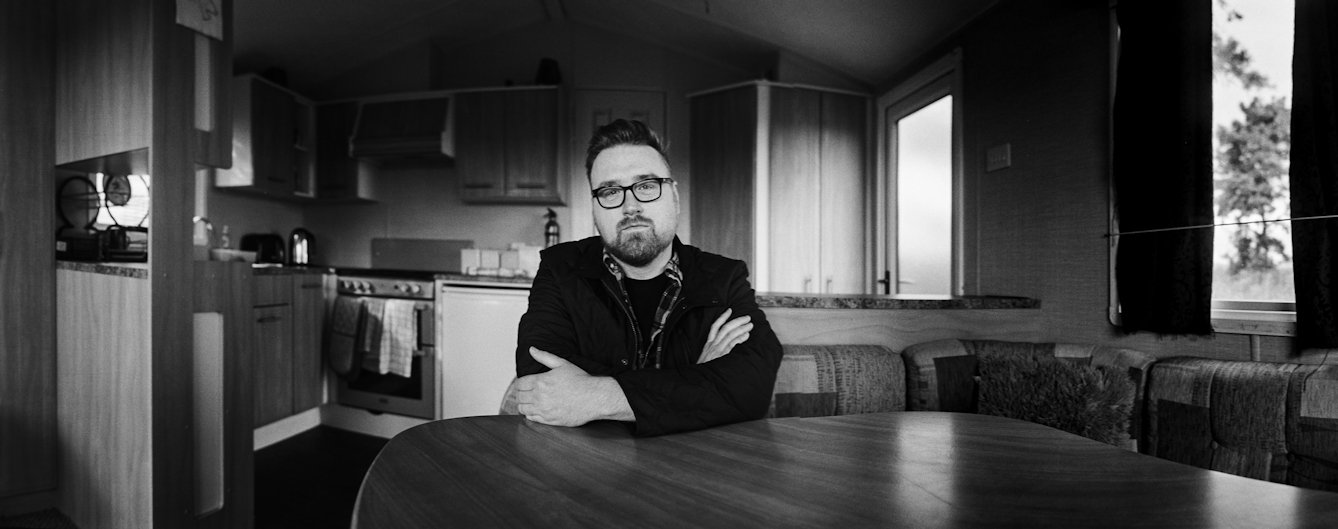
Daniel, Morpeth. Diagnosed 2017.
I had ME from the age of about 10 up to 17 and then slowly improved and thought I had recovered. For two decades, I went on to live a normal life – university, marriage, kids, a career. Then, in 2017, my symptoms came back with a vengeance. It was like a bad flu without the flu symptoms; I was just utterly exhausted. It was devastating to realise that ME was back in my life.
I had to leave my job as a senior practitioner and social worker because I simply couldn’t manage it any more. Financially, it hit us hard: we had to move into a static caravan on my parents’ farm because we couldn’t afford the mortgage. My wife, who now works full time as a nurse, has become the primary breadwinner while also caring for our two children. It’s been a big adjustment for all of us, especially the kids. The impact on them has been significant, and it’s hard to see the strain on my family.
I had to push hard for a diagnosis; it was like they didn’t believe me. The lack of understanding and support from healthcare professionals is incredibly frustrating. I was really scared when my symptoms came back. I even hoped it might be something else, like MS, because at least there would be medication and more support available.
It’s disheartening that after all these years, nothing has really changed. The controversial PACE trials, which compared treatments for ME, only made things worse, framing ME as a psychological issue rather than a physical one. It’s frustrating that ME is still not properly understood or taken seriously.
Living with ME/CFS is incredibly challenging. Some days are better than others, but most days I struggle with extreme fatigue, cognitive difficulties and severe tremors. We need more understanding and a commitment to finding real solutions. My experience with ME/CFS has shown me how crucial it is for medical professionals to listen to and believe their patients. We need real change and better support systems in place.
Angus and Tina
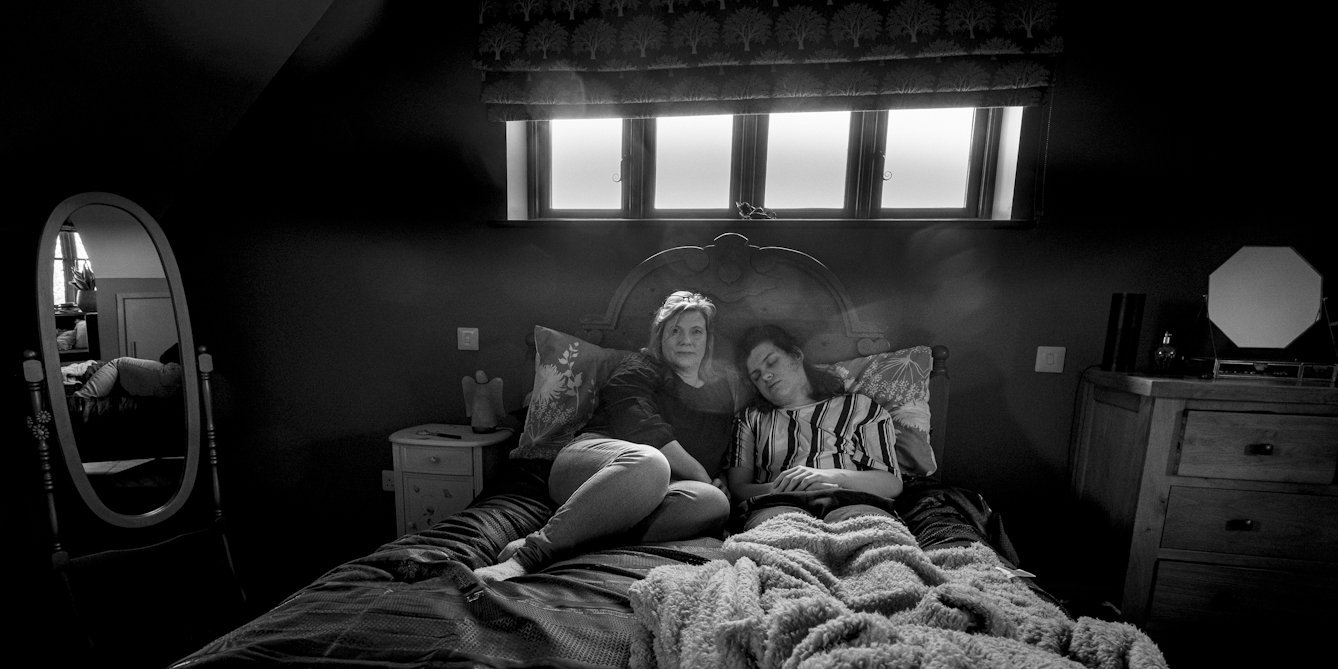
Angus and Tina, Suffolk. Diagnosed 2013.
Angus was too ill to be interviewed. His story is told by his mother, Tina.
Angus and his sister came down with a virus; she shook it off, but Angus never seemed to recover fully. He’d seem fine one moment and then crash the next. After months of this, I took him to the hospital, where they were concerned about heart rate and blood pressure. I didn’t understand what the numbers meant at the time, but looking back, it was clear something was seriously wrong. Despite this, when the consultant came round and I explained the history, he brushed it off. We left without answers, and I felt more lost than ever.
Angus was pushed to go back to school even though he was clearly unwell. I tried to manage it by getting him on a part-time schedule. The school thought I was being overprotective. At one hospital appointment the physio took him into a room without my knowledge and made him do physical exercises – 20 times standing up from a chair and 20 times catching a medicine ball. Angus told me later that something inside him changed that day. He wasn’t the same afterwards.
He managed to cling on to some form of activity for the next few months and then he slowly became bed-bound and has been bed-bound more or less ever since. What I mean by bed-bound is he can’t sit up until about four o’clock in the afternoon. Doctors talked about different diagnoses – post-viral syndrome, chronic fatigue, psychological issues – but none seemed to fully capture what was happening to him. No one ever explained PEM (post-exertional malaise) and the importance of it. Eventually, he was diagnosed with postural orthostatic tachycardia syndrome (POTS) and Ehlers-Danlos syndrome (EDS).
This experience has been nothing short of a nightmare. I’ve been blamed for Angus’ illness, accused of making him worse with my anxiety. The fear of losing him to a system that doesn’t understand or believe us has haunted me every day. I’ve watched other mothers lose their children for the same reasons, and it terrifies me. I’ve developed PTSD from the way we’ve been treated, and I no longer trust doctors.
We’re fighting not just against Angus’s illness but against a system that has tried to erase his suffering and blame me for it. Good treatment isn’t just about getting the right diagnosis – it’s about being believed, supported, and treated with dignity. That’s something we’re still desperately seeking.
Zaya
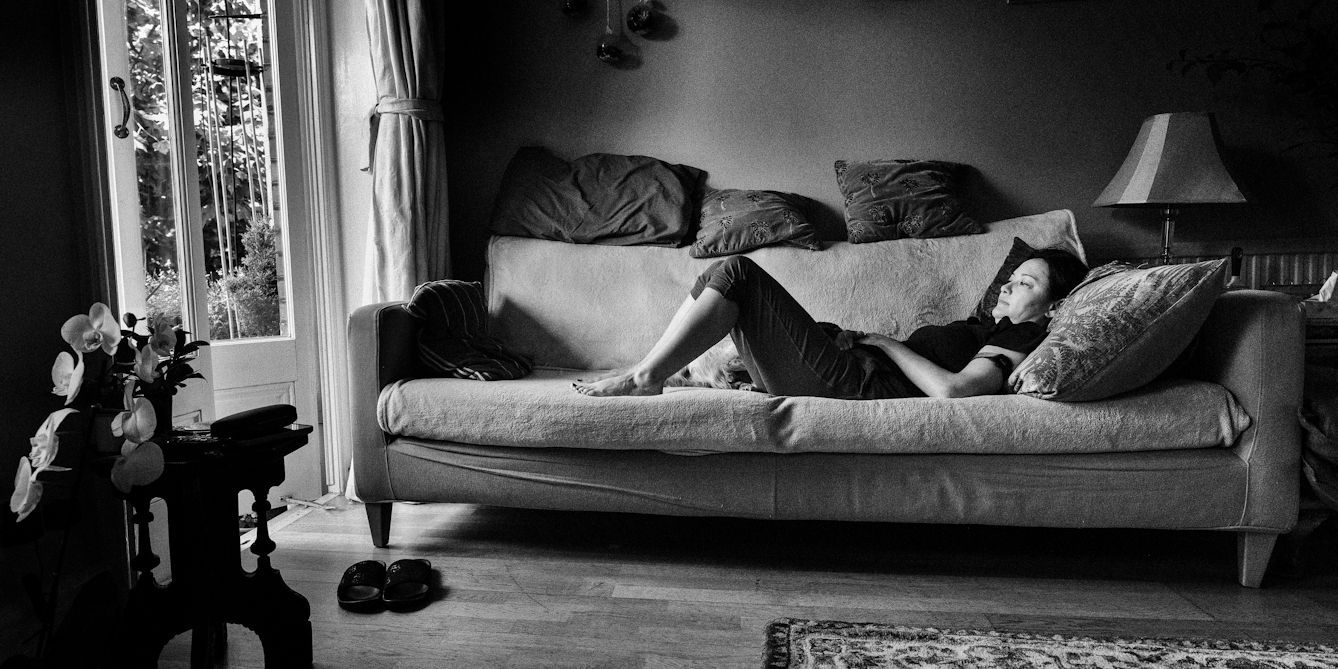
Zaya, London. Diagnosed 2019.
I remember the date – 18 January – because it was the day everything changed. I thought I had a bad flu, and I was convinced I’d be fine after a weekend of rest. But that never happened. I couldn’t recover, no matter how much time passed. After a week I called my GP, and then, after two weeks, I went to an emergency appointment because I could barely walk, which felt strange even for the flu. They told me it was probably post-viral fatigue and that it would pass in a month, then two, then three. But as the months dragged on, I still wasn’t getting better.
I started doing my own research, and ME/CFS kept coming up. Eventually, in May, I saw a doctor from the ME Trust (now merged with Action for ME) while waiting for my NHS referral, and he confirmed the diagnosis. On one hand, it was a relief to finally know what was wrong with me because I thought I was going crazy. But on the other hand, it was incredibly upsetting. I had a friend who had ME when I was a teenager, and it was the disease that scared me the most because it was the opposite of who I was – active, full of energy. I never imagined that one day I’d be dealing with the same thing.
When I was first diagnosed, I had this idea that I’d get better within two years. I don’t know why I thought that – I’d read somewhere that most people recover within that timeframe. So I kept telling my job that I’d be back in a couple of months, and I lived like that for two years, constantly believing I’d be better soon.
But as time went on, I realised I had to stop thinking that way. It was soul-destroying to live in constant limbo, my life on hold, waiting for a recovery that wasn’t happening. I had to accept that maybe this was my new reality and start finding ways to live with it.
Brain fog is my main symptom, and it’s the one that frustrates me the most. At first, it terrified me because I thought I had brain damage or was developing dementia. I even had a psychological assessment early one morning, which reassured me that my brain is actually fine – it’s just that I don’t have the energy to make it work properly.
Socialising and phone calls are particularly exhausting, so I limit them as much as I can. I’ve learned to manage short walks and a few hours of activity each day, but most of my time is spent lying down, conserving energy.
When I first became ill, I was desperate for answers and guidance from the medical professionals I trusted. Unfortunately, the advice I received often made things worse. Early on, I was told by doctors that my symptoms were likely just post-viral fatigue and that I would recover soon if I pushed through and tried to stay active.
It wasn’t until I started doing my own research and sought out specialists who understood ME/CFS that I learned the importance of pacing and rest to avoid further deterioration. By then I’d already done damage that might have been avoided. The frustration of being misinformed by the very people who were supposed to help me has stayed with me, and it has made me wary of the non-specialist medical advice I receive.
Julie
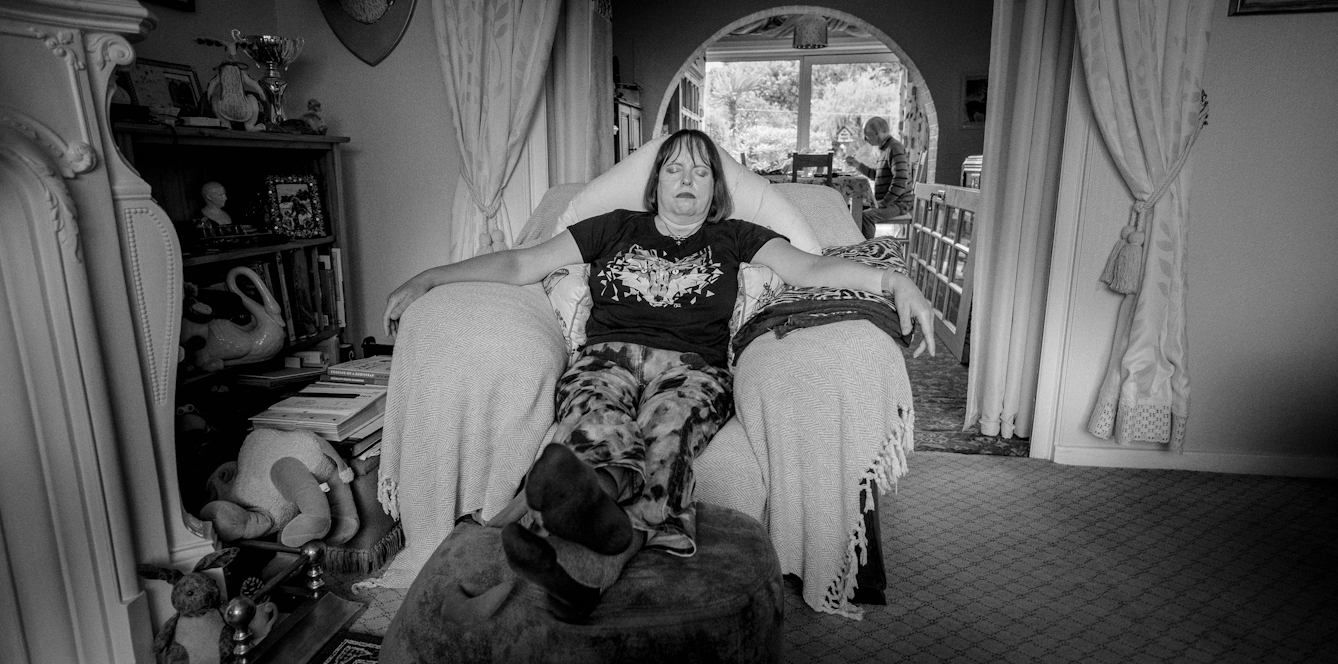
Julie, Sheffield. Diagnosed 1993.
I was at Sheffield Hallam University doing silversmithing and jewellery and I caught a bad cold that never fully went away. Weeks later, I woke up one night drenched in sweat and began experiencing vertigo, where even slight movements would cause my head to spin.
I had a nice GP at the time and she told me that when she was a young doctor she had Epstein-Barr virus and glandular fever, and it took months to get over it. So she sort of got the fatigue thing. She referred me to the Hallamshire Hospital in Sheffield and they did all sorts of tests, and eventually they said I had CFS.
The impact of ME/CFS on my life has been extensive. I took a year off from university to recover and tried to continue with my course, but I was struggling. After another bout of Epstein-Barr virus, which knocked me out for several months, I retrained and worked in various roles, including at a law centre and the Home Office. But the fatigue and pain made even simple tasks, like typing reports, extremely challenging, leading me to leave these roles behind. Now I live with my dad in his house.
Managing ME/CFS involves a constant balancing act. My daily routine includes taking frequent breaks and napping for about an hour in the afternoon to recharge. I find that I can manage until about 5 or 6 p.m. before I need to wind down for the evening. Throughout the day, I also deal with various symptoms, such as dizziness and a racing heart rate, which I now recognise as part of my ME/CFS, though they were initially confusing.
The ongoing challenge with ME/CFS is not just the physical symptoms but also the lack of understanding and effective treatment from the medical community. The frustration of dealing with dismissive doctors who have offered no meaningful solutions has been a constant source of distress. Despite these challenges, I continue to adapt my life and seek understanding from others with similar experiences, as they are the only ones who truly grasp the daily reality of living with ME/CFS.
Dareth
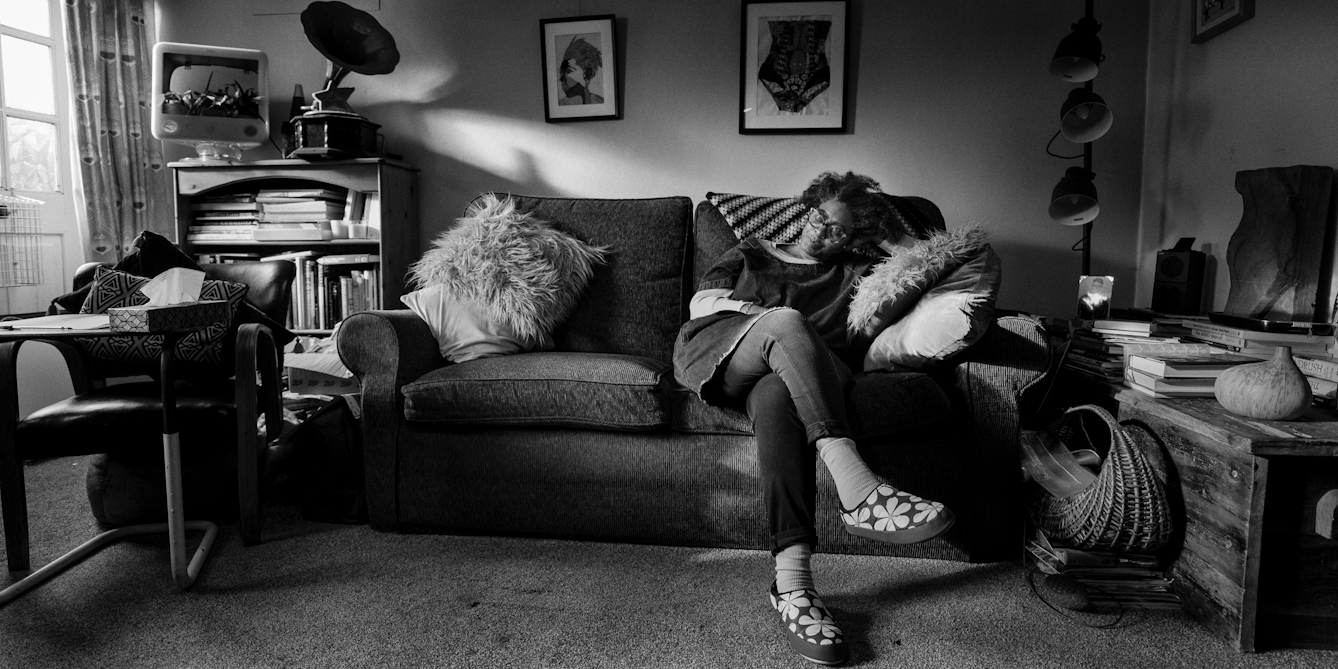
Dareth, Stroud. Diagnosed 1995.
I was a mature full-time student when I was diagnosed. I had to leave my course, I used up all my savings and lost my rented flat. I was categorised as homeless and medically vulnerable. My boyfriend, who I’d been dating for about a year, offered me a temporary place to stay until I was allocated a council studio. Eventually I moved back in with my boyfriend.
Although I was mostly bed-bound, his support was invaluable. I could barely manage little tasks around the house, but every small achievement gave me a boost. I remember the excitement of temping in an office where I was allowed to rest in the meeting room at lunchtimes. It was exhausting, but I felt like I was starting to function again. I eventually managed to get a permanent part-time office job.
My boyfriend, who I eventually married, has been a rock. He supported me through the ups and downs and we eventually decided that I would stay at home to manage my health and take care of our child. Our early years together were very challenging, but we have somehow made it through to 30 years.
In my life now I sometimes feel invisible, since people only see me when I’m well enough to be about, and I miss out on lots of community activity – pub nights, outings, dinner parties, camping trips and holidays. I’m a ‘ghost’ member of busy WhatsApp groups but I mostly get excluded from the smaller group chats, as it’s assumed that I’m not likely to be able to participate. It’s tough to see life moving on without me and it can feel like my condition makes me less relevant in social circles.
Looking back, I’m content with how my life has unfolded. Despite the limitations of ME/CFS, I’ve managed to build a home and family, pursue work that I could handle, and fought and won the battle to claim Personal Independence Payment (PIP). My life may not be as colourful as I had hoped, but I have learned to be flexible with my self-imposed expectations and find fulfilment in my everyday personal victories. I feel that I have achieved many of my recalibrated goals and ambitions, and, despite the struggles, I consider my life to be rich and meaningful.
Dugald
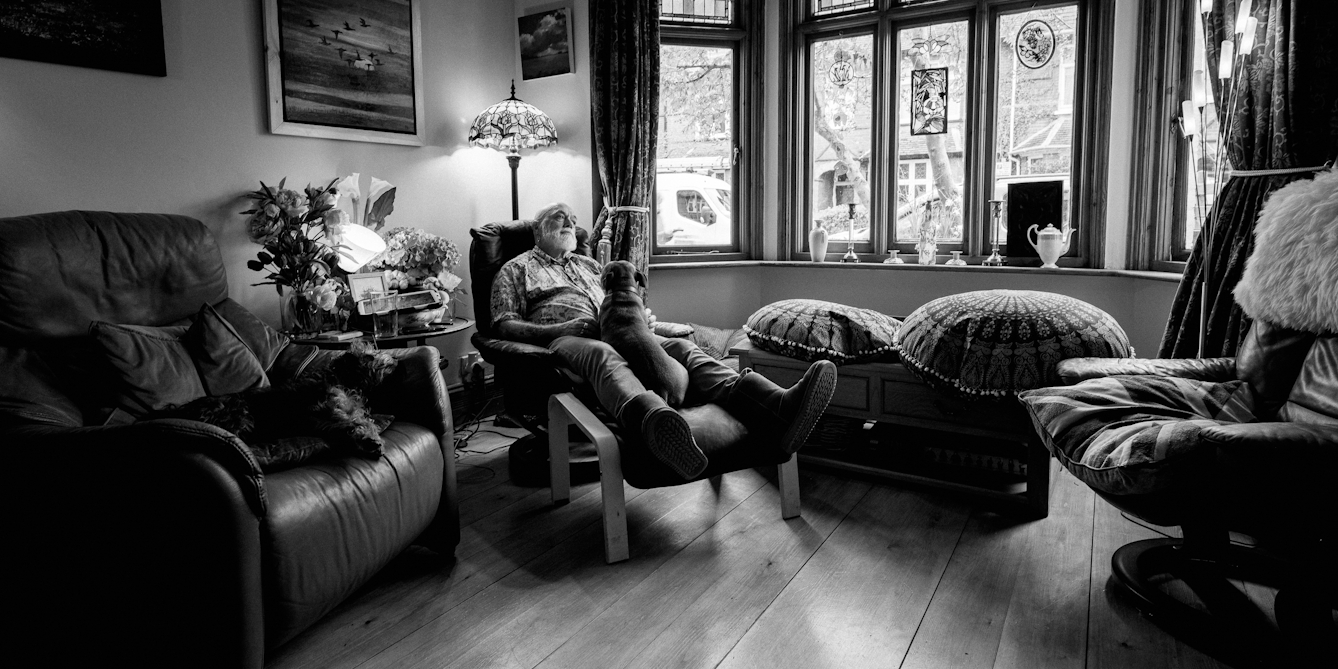
Dugald, Norwich. Diagnosed 2001.
I was diagnosed with ME in 2001 when I was around 45 years old. Before that, I had experienced odd episodes of illness back in the 1980s, where I couldn’t walk properly and felt generally unwell. These episodes were brief and resolved on their own, but they left me with an unsettling sense of what was to come.
It wasn’t until I got a major virus while working as a deputy head teacher in New Zealand in 1997 that my condition took a turn for the worse. I thought it was flu, but it left me bedridden and unable to function normally for months.
Returning to England in 1998, I had some respite for a while, but the stress of teaching took a toll on my health. My symptoms, which included overwhelming fatigue and deep, widespread aches, became severe. Even though I managed to carry on working, I had frequent relapses which left me feeling completely drained.
Despite some periods of improvement, the reality of ME is that it’s unpredictable. The exhaustion and physical pain are relentless, and managing daily tasks has become an ongoing struggle.
One particularly harrowing episode occurred while I was in Norwich with my wife. After a routine optician’s appointment, I felt an overwhelming wave of fatigue hit me. I was in such distress that I remember thinking, “Kill me now” – I just couldn’t face the drive home through busy traffic. It’s moments like this that push home the severity of my condition and the intense mental and physical strain that comes with it.
ME has isolated me socially. Lots of people, including close family members, have struggled to understand the extent of my illness. Even those who have known me for years sometimes struggle to grasp the reality of living with ME. Some people took a long time to accept that I wasn’t simply seeking attention but was genuinely affected by this debilitating condition.
Today my life is constrained by my health. ME is always lurking, ready to knock me back down. I can’t predict how I’ll feel from one day to the next. I rely on support from a few close friends and family, and this support network is essential as I continue to cope with the constant fatigue and limitations imposed by ME.
Shreya
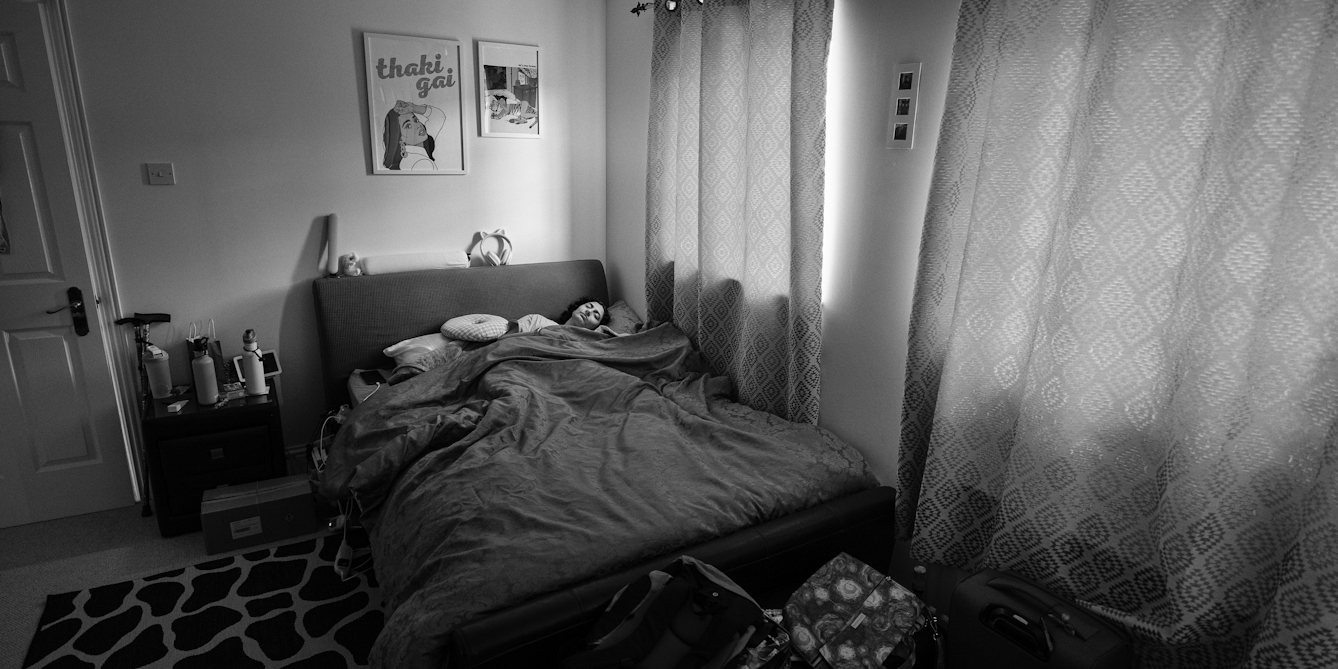
Shreya, Bedford. Diagnosed 2020.
When I was diagnosed with ME it felt like everything changed overnight. My symptoms became severe almost immediately: I began experiencing palpitations, constant dizziness, and I couldn’t manage stairs without a walking stick. I had to drop out of my master’s programme and give up on my plans for a PhD.
I tried to build a career in the creative arts, balancing acting and tutoring, but I wasn’t earning enough to live independently, so I had to move away from my flat and back in with my parents. I had to cut down my working hours a lot.
Then last year, I did a theatre tour, but the way that it was set up was really badly organised in terms of access, and I ended up pushing myself a lot more than I should have. And after that, I was not necessarily bed-bound, but confined to my room for a very, very long time – about three months. And then only then did I start to be able to get outside of my room a little bit and since then, my condition has been a lot worse.
On top of the severe fatigue, I also contend with chronic migraines. Some days I can barely get out of bed, and on others I might be able to engage in light activities, depending on the severity of my symptoms. My routine is almost non-existent; I wake up around midday if I can manage it, and often spend the day either in bed or slowly getting up to get water or use the toilet. I check in with my pacing app to monitor my symptoms, but it’s challenging to track both physical and mental fatigue accurately.
Overall, managing ME means navigating a life filled with unpredictability and constant adjustments. The fatigue and migraines severely limit my capacity to engage in daily activities and work, and it forces me to adapt continually to my fluctuating health.
About the photographer
Jeremy Jeffs
Jeremy Jeffs is a documentary filmmaker and photographer with more than 40 broadcast films to his credit. His work has been shown at the V & A, the National Film Theatre, and at many festivals around the world. His latest feature-length documentary, ‘Bay of Blood’, uncovers the genocide that took place in Bangladesh in 1971. His first photobook, ‘We Do Not Consent’, was published in 2022, and features documentary photographs that examine the increased use of police powers against protestors. He’s a partner in a creative video agency, specialising in making films about healthcare issues.
